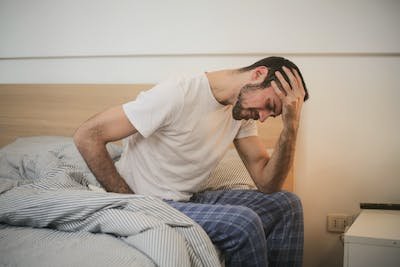Constipation is a disorder of the bowel in which bowel movements become infrequent, hard, or dry. It is often due to inadequate fiber intake, unbalanced diet, lack of exercise, and certain medications. Constipation can be uncomfortable and embarrassing. It can also lead to other health problems such as haemorrhoids (piles), anal fissures (fissures) and faecal impaction.
Constipation is a common problem and it can happen for a variety of reasons. It can be caused by diet, lifestyle, medications, or by something more serious like a chronic disease. Constipation can cause pain and discomfort. Some people experience constipation from time to time and they don't need to see their doctor about it. Others might have constipation that lasts for weeks or months and needs medical attention.
The most common causes of constipation are things like not drinking enough fluids, eating too much dairy or not enough fiber in your diet, taking certain medications such as pain relievers or antidepressants, or having an underlying condition such as irritable bowel syndrome (IBS). Constipation is usually treated with changes in diet and lifestyle habits like drinking more fluids, exercising regularly, eating more fiber-rich foods, and getting enough sleep.
Constipation is the most common gastrointestinal disorder. It is a common cause of abdominal pain and discomfort, as well as bloating, gas and general discomfort.
What are the causes of constipation?
The main cause of constipation is not having enough fiber in your diet. Fiber helps keep your intestines moving smoothly, so if you don't eat enough fiber-rich foods, you'll be more likely to experience constipation.
Other causes include:
-Lack of physical activity
-Inadequate fluid intake
-Medications
-Certain health conditions such as Parkinson's disease or diabetes

The causes of constipation can vary from person to person, but it often comes down to lifestyle choices such as diet and exercise or medical problems such as irritable bowel syndrome or inflammatory bowel disease. Treatment for constipation can vary depending on the cause, but includes dietary changes and medication such as laxatives and enemas.
Constipation is a common problem that can be caused by a variety of reasons. In this article, we will discuss the causes, symptoms and treatments for constipation. We will also talk about the importance of prevention and how you can live with constipation.
Constipation is one of the most common gastrointestinal problems in adults. It affects up to 15% of people in their lifetime and it is more common in women than men.
Constipation can be caused by many things such as a change in diet, not drinking enough water, taking certain medications or having a bowel obstruction or fecal impaction. There are many different types of constipation including functional constipation, chronic idiopathic constipation, slow transit constipation and acute necrotizing enterocolitis (NEC). The symptoms vary depending on the type but include fewer bowel movements than usual, hard stools that are difficult to pass and painful bowel movements. Some people may also experience pain in their abdomen or rectum
Constipation may cause abdominal pain, bloating, gas and a feeling that you need to have a bowel movement but can't go. If left untreated it can lead to hemorrhoids or anal fissures and may lead to fecal incontinence. In children it can lead to failure to thrive (poor growth. Constipation is a condition where the stool moves slowly through the colon. In many cases, this is because of infrequent bowel movements. The stool hardens and becomes difficult to pass.
Constipation is the infrequent passage of hard, dry, and lumpy stools. It is a common gastrointestinal disorder that can be either chronic or acute. Constipation is a symptom of many diseases including irritable bowel syndrome, inflammatory bowel disease, diabetes mellitus and Parkinson's disease.
The causes of constipation are many and include diet, lack of exercise, medications like opioids and anticholinergics (medications for colds), lack of fiber in the diet or from straining during bowel movements to avoid passing gas or stool. Some individuals have difficulty with the normal contraction of their colon muscles which may be due to nerve damage from diabetes or Parkinson's disease.

There are treatments for constipation including increasing dietary fiber intake by eating more fruits, vegetables and whole grains; taking a daily laxative; using stool softeners; drinking plenty of fluids to help with bowel movements; avoiding certain foods that can worsen constipation such as dairy products and high-fiber Constipation is a condition in which bowel movements are infrequent or hard to pass. The stool may be hard and dry, and may be painful to pass.
The causes of constipation vary from person to person. It can be caused by not drinking enough fluids, not eating enough fiber, being inactive, or taking certain medications.
Some people experience constipation due to a medical condition such as irritable bowel syndrome or inflammatory bowel disease. Constipation also can occur during pregnancy or after childbirth when the pelvic floor muscles are weakened.
Constipation is a common digestive disorder that affects the large intestine. Constipation occurs when a person has fewer than three bowel movements per week, or when the person has difficulty passing stool.
Constipation may be caused by many factors such as poor diet, lack of exercise, not drinking enough water, stress and medications. It can be treated with dietary changes such as increasing fiber intake and fluids and/or taking laxatives or stool softeners.
Constipation is the condition of having less than three bowel movements a week. It can be caused by many things, from what you eat to how much you exercise. Constipation can cause bloating, stomach pain, and other symptoms. There are many treatments for constipation that can help prevent it from happening again.
(1). https://www.webmd.com/digestive-disorders/features/chronic-constipation-facts-vs-myths
(3). https://www.everydayhealth.com/constipation/guide/
(4). https://my.clevelandclinic.org/health/diseases/4059-constipation
As you say, the main cause of constipation is not having enough fiber in the diet, and unfortunately many people do not pay attention to this and end up suffering from constipation.
Lack of exercise causes constipation but I know of a friend that plays football on a regular yet comes up with constipation at all time. What may likely be the cause? Thank you for the lecture